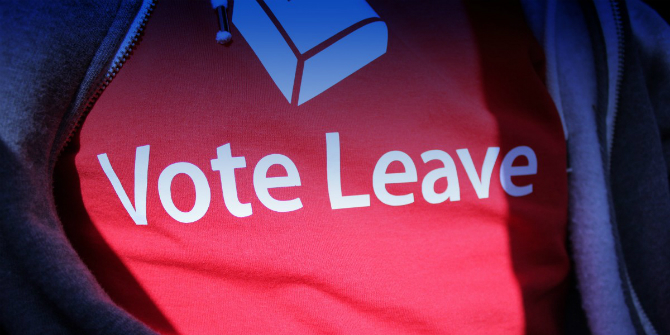 The two and a half years following the EU referendum have exposed the wishful thinking that drove many free-market conservatives to support Brexit. In this post, Dalibor Rohac (American Enterprise Institute) asks how Brexit is working out for those who supported it on libertarian grounds.
The two and a half years following the EU referendum have exposed the wishful thinking that drove many free-market conservatives to support Brexit. In this post, Dalibor Rohac (American Enterprise Institute) asks how Brexit is working out for those who supported it on libertarian grounds.
Last week, I witnessed a somewhat extraordinary occurrence take place on Twitter. A former prominent Leave supporter and a friend, Roland Smith, said that he had been wrong to advocate for the UK’s departure from the European Union, citing a post that I had written for LSE’s Brexit blog shortly after the referendum.
My piece argued that Leavers who advocated Brexit on sincere free-market, conservative grounds, of whom Smith was a thoughtful and intellectually honest example, were about to be mugged by reality. They were going to get a Brexit – just not the kind of Brexit that they were hoping for, ushering in a new era of economic openness and deregulation.
The vision of Brexit that Smith, among others, advocated was a prudent one. The point was not to repudiate the past 40 years but to build on them constructively, while taking full advantage of the opportunities that the globalised world offers:
We would likely first move to a single market position outside the EU using the EEA framework as a model. In other words, still in economic union but not in political union. That would create a trade-based counterweight to the EU in Europe and may well draw other EU member states out to that position. The journey would continue from there, ending in a position as a regional player in the global single market, leveraging our historic connections around the world. […]
The moment of Brexit is therefore a turning-the-ship event; it is not the final destination. Accept that and much else falls into place. One might add that if ‘Leave’ were to win the referendum, it would be the Conservative government (over half of whom are Remainers) advised by the civil service that will manage the aftermath. It will not be the Leave campaign. The method of exit will therefore be evolution – the art of the possible – not revolution.

In retrospect, it is easy to see how hopelessly at odds with political reality this vision was. Because of the salience of immigration during the campaign, the EEA framework was immediately taken off the table by the UK government. Not only that, but the idea of Brexit as “a turning-the-ship event” is anathema to the vocal group of leading Euroskeptics, for whom Brexit is a revolutionary and not a gradual step. In those circles, anything less than a hard Brexit – or, better still, a unicorn Brexit that combines a complete freedom of action for the UK with its continued unhampered access to the EU’s common market – is seen as a betrayal of the mandate of the 2016 referendum.
Given the British red lines, especially on immigration, and the EU’s understandable reluctance to extend the benefits of membership to non-members, the agreement concluded by Theresa May’s government is as good as any that could have been reasonably achieved. Leaving an organisation such as the EU was never going to be a free lunch but would involve trade-offs. Preserving the current level of market integration with the EU outside of the bloc reduces the UK to the position of a rule-taker; ‘taking back control’, meanwhile, means new non-tariff barriers in the English Channel.
Many leavers were also propelled by a naïve idea about international trade, hoping that any disruption in economic relations with the continent would be more than outweighed by the flurry of trade agreements that the UK would conclude with countries around the world. Yet, the practical problems with this approach are immense. First, the geography of international trade makes it unlikely for the UK to reap the same benefits from deeper economic ties with distant countries such as Canada, New Zealand, India, or Australia, compared to the European market of 450 million people right next door. In light of trade tensions between China and the United States, it is also quite plausible that, in comparison to past decades, the international environment is going to be much less amenable to further trade liberalisation.
Second, there are problems of timing and bandwidth. The UK government cannot start trade negotiations in earnest before it knows the terms of its departure. Concluding genuinely meaningful trade deals, furthermore, takes many years of efforts and involves the same difficult trade-offs over ‘control’ and the depth of economic integration as the European project. Finally, trade negotiations need trade negotiators and a government that has a focus and strategy.
Because of the all-encompassing nature of Brexit, the UK lacks all of three of those. The problem extends far beyond just trade. Compared to June 2016, the post-EU UK will be also entering a more turbulent international environment. In Washington, isolationism has made a comeback, raising questions over the future of the transatlantic partnership. The Middle East is in turmoil, the Kremlin has been flexing its muscles, and Chinese influence throughout Asia and the Pacific is rising, amidst reports of Chinese espionage in the West. Meanwhile, Westminster is absorbed in the minutiae of the Irish backstop and Tory infighting. No matter the final outcome, the UK will inevitably leave the EU diminished geopolitically – if only because its government has paid close to zero attention to world events since the referendum.
The same is true at home. Currently in its ninth year of successive Conservative-led governments, the UK should have been living in a free-market utopia by now. There is no shortage of reforms a pro-market government could undertake to re-kindle growth, boost the housing stock, and expand economic opportunities, particularly to those on the bottom rungs of the economic ladder. Yet, all such considerations have been crowded out by the debate over the UK’s post-EU future. No wonder, the UK’s growth is projected at around 1.5 percent in the coming years (conditional on a smooth, trade-friendly Brexit) and the economy recorded “weaker wage growth than any other advanced G-20 nation” in 2017.
Some argued that the UK was always a misfit within the EU and that its departure would enable particularly the Eurozone to move towards economic reforms necessary to make the bloc work. Yet, EU-27 today does not seem any more cohesive or functional than the status quo before the referendum. The recent Treaty of Aachen between France and Germany shows that the bloc might well move towards a more disaggregated form of integration, with a sizeable periphery that risks being left marginalised. Without the UK at the table, Berlin, Paris, and European institutions face only weak incentives to make the European project work also for countries that are not necessarily interested in ever-tighter forms of political integration.
The two and a half years following the referendum have exposed the wishful thinking that drove many free-market conservatives to support Brexit. Contrary to promises that were made, the three options ahead are all unappealing. Crashing out on 29 March would be catastrophic, both for the UK and the EU. Holding another referendum and perhaps calling the entire thing off is fraught with danger. And because it delivers no free lunches, everybody seems intent on hating the compromise that Prime Minister Theresa May negotiated, placing her (once again) in an impossible situation. It is hard to see where things go from here but it is abundantly clear that in June 2016, the British people were sold a colossal lie – with ample assistance from those who should have known better.
This article gives the views of the author, and not the position of LSE Brexit, nor of the London School of Economics.
Dalibor Rohac is a research fellow at the American Enterprise Institute in Washington DC. Twitter: @daliborrohac.







Good to see a piece supportive of the EU by somebody with a conservative viewpoint. I see the author has links with the IEA, one of Margaret Thatcher’s favourite thinktanks. Indeed I remember when the IEA was a great favourite of the LSE economics department in the 1970’s, when Alan Walters, Peter Bauer, Brian Griffiths and others were making the intellectual case for Thatcherism in the face of strong socialist opposition.
I have been amazed how it is automatically assumed that conservative economics and opposition to the EU are supposedly inextricably linked, a shibboleth deep in the DNA of today’s British Conservative Party. As many have pointed out, to deaf Conservative ears, the Single Market, expansion to the East, constitutional safeguards on national sovereignty, etc., etc. have all been included deep in the EU model due to British Conservative lobbying. The visceral hatred of the EU by modern British Conservatives is something, to outsiders, astonishing to behold.
and if and when the EU imposes anti – dumping duties on steel during the transitional period ( a matter on which the UK will have no vote) how will the free marketers feel then ?
We (press, observers, public) have all largely ignored the role and motivations of the real drivers of this Brexit saga – those who seek to profit from the newly deregulated, increasingly privatised, tax-haven status of the UK so close to the front door of the EU. The anti-immigrant sovereignty-obsessed lumpen were but the tool used at the beck and call of the dark powers – the wealthy elites, the tax evaders, the foreign opportunists. This will in all probability only be exposed long after the real damage has been done. In time for the historians, but not for the underprivileged seeking a reasonable life. We can but hope that common sense ultimately prevails.
Luxembourg and the Netherlands are taxhavens, right in the thick of it.
There seems to be 5 options left on the table.
1. Agree to the current or maybe slightly improved deal.
2. A No Deal Brexit (Not acceptable because of the Irish Border)
3. Time Extension (Not in compliance with Referendum)
4. 2nd Referendum (A insult to the people and democracy.
5. Cancel Brexit ( Will cause major unrest, disruption, demonstrations &violence)
6..General Election (No alternative stable alternative to the Tory Party)
Any deal with Europe will still give them control over the UK so a no Deal Exit is the only logical step. We may find it problematic for a short period of time but we will be self governing and Free again
Roger thurman . Role inversion. The wealthy and elites pushed for remain fullbore.and even today, with 2 months to go they are trying to overturn the result of 2016. You are role inversing. The eu’ s role is to distance the population from the democratic process- within a few years the eu would have succeeded. Ever closer union, debt mutualization, eu army, all run by the elite in brussels with their tax free salaries. We saw through it, and snatched the last chance we would have. Tic toc.
We might add that the pro-market leavers who hoped for a ‘bonfire of regulations’ underestimated or chose to ignore the massive lobbying opportunity that Brexit will provide for interest groups of all kinds. Once free of the EU’s constraints (especially on state aids), British governments of any complexion will be more susceptible to sectional interests and regulatory capture.
The fact that years of Conservative-led governments has not produced ‘a free-market utopia’ is hardly due to Brexit; it more suggests those governments did not have particularly market-oriented aspirations — and neither may their successors. Whether that’s good or bad is another matter!